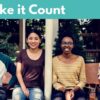With the presentation of the showcase (recording available here), the California Election Data Challenge 2020 has concluded! We want to thank everyone who participated and volunteered their time to the project.
Congratulations go out to the three winning teams, install.packages(“tidywitches”), MissDemeanors, and Catch-22, with honorable mention going to teams Dialysis Analysis and Wobbler Costs. You can learn more about each team on the main challenge page.
Twenty teams of UC Davis students, scholars, and alumni submitted projects to the Challenge. The Challenge engaged over 100 participants, with nearly equal participation from graduate and undergraduate students. Several postdoctoral scholars, staff, alumni, and community members also participated in the challenge. Participants’ backgrounds reflected the diversity of our campus, hailing from over 18 different domains and departments.
Teams developed a research question focusing on an aspect of a proposition on the California November 2020 ballot and leveraged public datasets to create a reproducible data visualization. While teams worked on 8 of the 12 ballot initiatives, the most popular propositions as selected by the teams were 17 (parolee voting rights), 18 (voting rights for 17 year olds), and 21 (rent control).
Projects were shared via an online asynchronous showcase and reviewed by over a dozen judges including UC Davis faculty, data scientists, and invited external reviewers. The judges were universally impressed with the quality, creativity and thoughtfulness of all projects completed for this short competition. Judges remarks included: “It was a real delight to get to hear about these projects and to explore their data and visualizations,” and “I was impressed by how smart, clever and creatively our UC Davis teams addressed this Challenge.” The Challenge mentors also praised the teams’ efforts to ask relevant, meaningful questions and to help inform civic dialogue. One mentor remarked: “While I know this wasn’t an explicit goal of the Challenge, the data presented by several of the projects even helped me decide how to vote.”
The winning projects most epitomized the Challenge’s goals of promoting data literacy and employed reproducible research methods to make data-driven storytelling accessible. These teams used innovative approaches to investigate thoughtful, civically-relevant questions. The three team finalists will present at the Challenge Finale Webinar on October 21 from 5 to 7 along with keynote speakers MacKenzie Smith (University Librarian and Vice Provost of Digital Scholarship), Mindy Romero (founder and director of the Center for Inclusive Democracy), and Jesse Salinas (Yolo County Clerk).





